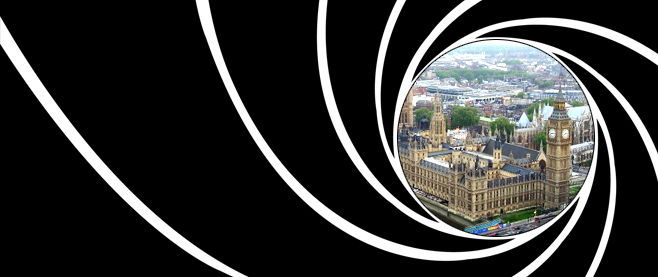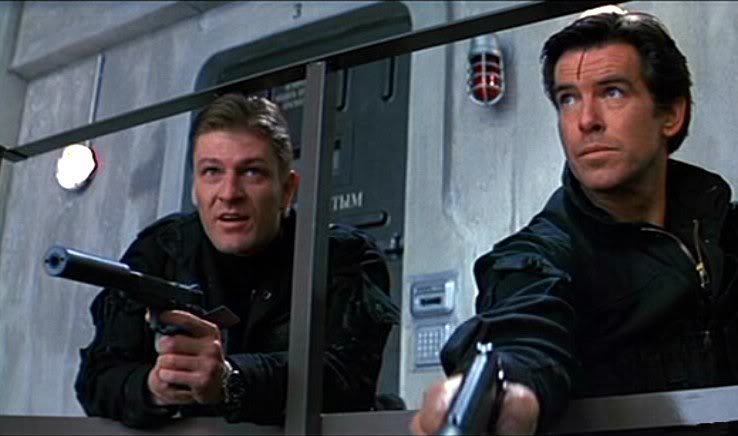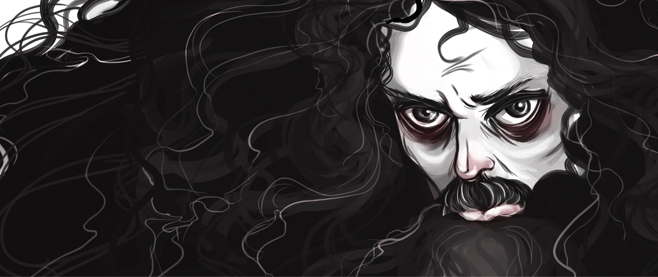
GoldenEye and the Politics of Espionage
“Do you even know who the enemy is?”
GoldenEye is a complex film, more complex than we first expect from an explosion-happy Bond comeback with that guy from Lawnmower Man in lead. This is the first time that a Bond film has legitimately tried to figure out who Bond is, why he does this shit, and how political Bond’s espionage is. More importantly, GoldenEye is quite happy to admit that much of the problems Bond faces are Britain’s fault.
Great Britain is the villain.
Bond films traditionally haven’t bothered going back in time to look at what Bond did when he was a rookie agent – mostly having his gun go off prematurely at parties and trying to avoid getting sued for sexual harassment at work. You might notice that Bond girls usually don’t reappear in later Bond films (as if screwing them once spoils them) and though there might be recurring characters, such as Jaws, Blofeld, Q and Moneypenny’s ass, we never get to see Bond get debriefed (steady, ladies) or hear what he actually thinks about any of the missions he gets sent on. The past rarely comes back to perturb Bond’s steely gaze.
[pullquote]The Cold War is over and Bond has settled into a life of poontang and scrawling ‘LOL’ on risk assessment paperwork.[/pullquote]
Of course, as a commander in the Royal Navy, Bond would never ask his superiors why, but GoldenEye finds a particular wound in Bond to bludgeon: that Britain has war crimes unpunished and blood on its hands. Its foreign policy is at once arbitrating blood feuds and participating in them and Bond himself is a silent and lethal criminal, with Her Majesty’s blessing.
This is important because Bond films are never inward-looking, navel-gaze material. Actions are done to others, not to Bond. But here, Bond is pressed for his ethics, morals, his very allegiance to the Crown. Bond’s nemesis mocks him as “Her Majesty’s loyal terrier.” Bond fashions his mortal enemy from his best and most equivalent colleague, and has the audacity to believe that he has the moral high ground.
To approximate a recap, for those of you who haven’t seen the film in a while: opening with rookie Bond sneaking into the Arkangel Chemical Weapons Facility through a toilet (perhaps they had to haze him), Bond accidentally gets his pal 006, Alec Trevelyan, shot in the face (something I imagine he skewed to look more heroic in debrief). We know from our years of exposure to Bond’s methods that he prefers to work alone. Getting other people shot appears to be why.
We return nine years later, when the Cold War is over and Bond has settled into a life of poontang and scrawling ‘LOL’ on risk assessment paperwork. In the post-credits opening scene, he has combined the two by screwing the lady who was sent to evaluate his ability to drive an Aston Martin (assessment: V. Good). Bond soon gets sent on a dangerous mission to stop an orbiting space EMP called the GoldenEye from being fired at London.
nine years later, when the Cold War is over and Bond has settled into a life of poontang and scrawling ‘LOL’ on risk assessment paperwork. In the post-credits opening scene, he has combined the two by screwing the lady who was sent to evaluate his ability to drive an Aston Martin (assessment: V. Good). Bond soon gets sent on a dangerous mission to stop an orbiting space EMP called the GoldenEye from being fired at London.
———
Like the British Empire, James Bond as a character is always a violent aggressor in foreign territory, and as Derek Johnson says over in his excellent essay Requiem for the Cold War, he is constantly in conflict with other ethnic groups. It is as if Ian Fleming were saying that there is something suspicious or wicked about other nations, that they have to be put down, put in their place or otherwise shepherded. Le Chiffre, Auric Goldfinger and Ernst Blofeld are all distinguishably ‘foreign’ names. It is obvious from his descriptions of Bond’s foes as different or strange that Fleming, writing in the ’50s, believed that the world could do with being more civilized – and British.
It seems Jaclyn Friedman was right when she saw James Bond stories as laments for the British Empire. When M tells Bond, “you’re a sexist, misogynist dinosaur, a relic of the Cold War,” part of the sting of that roundhouse is because we know that Bond’s greatness is in his preserved Britishness – his suave Commonwealth ways that no longer exist.
Much of GoldenEye is spent looking at the past and having Bond wax nostalgic for how he used to “shoot in and out” of Russia, like his job actually meant something then, as if Xenia – a Russian assassin who literally gets off on killing – somehow would not exist if Bond hadn’t provided himself as a worthy sexual and martial opponent. CIA operative Jack Wade comments, “Just another stiff-assed Brit, with your secret codes and your passwords,” as if Bond were old-fashioned, behind the times, like a top hat or a cane or a Vesper Martini.
GoldenEye is a film written straight from the crotch, gung-ho, as if Aaron Sorkin’s patriotism had gone British and spunked on the page, but part of that might be because for the first time an American scriptwriter, Michael France, wrote the story and script. This was also the first Bond film that did not come directly from Ian Fleming’s works. (The irony of GoldenEye’s cynicism over Bond’s sovereignty coming straight from ‘France’ is not lost.) Despite this American bombasticism, however, Michael France satirizes any patriotic British notes in the film. Alec’s “James, for England” is dramatic irony minutes later, when the mission is a tragedy culminating in Alec’s face being punctured and him being burned to a crisp.
This is certainly not the first time an American has been cynical about British people through the power of celluloid. Hollywood virtually drips loathing for English accents. The entire crew of the Death Star, probably even down to the dude who scoops out sloppy joes in the canteen, had posh English patois; you’ve got Belloq in Indiana Jones, Terence Stamp in Superman, Jeremy Irons in the Lion King, Alan Rickman in, well, everything. Being English is suspicious to Americans. I mean, we did a sk the U.S. for tax once, then Sam Adams flipped the table and shot everyone. It is unsurprising that an American might cast a cynical eye over Britain’s most treasured cinematic possession: James Bond. He’s the only guy with an English accent who isn’t hurling kittens into lava.
sk the U.S. for tax once, then Sam Adams flipped the table and shot everyone. It is unsurprising that an American might cast a cynical eye over Britain’s most treasured cinematic possession: James Bond. He’s the only guy with an English accent who isn’t hurling kittens into lava.
———
Instead of being about standoffs, politicizing or voices whispering UAV coordinates, GoldenEye postures that the Cold War was somehow about ‘shooting in and out’ in the old days, when by the time Bond was on the scene in the ’60s, or, for GoldenEye‘s purposes, in the ’80s, “the last martial adventure of the old Commonwealth” was in the US-led Korean War of way back. After that, it was about interpreting radio silence, about reading into diplomatic transmissions, about fevered phone calls to President Kennedy and the proximity of the public to death.
The Cold War was cold, as George Orwell said in 1946, and Bond’s hot trigger finger would never have been risked on a twatty Colonel in the remote Russian enclaves. Refined Mr Bond, with his ability to shoot six men in the morning, have a girl at lunch and then be back in time for tea and medals seems too much for a Cold War stakeout. The idea, too, that Bond’s arrogant manner might be responsible for the death of his own colleague was a sign that Bond’s role in GoldenEye is pleasingly less straightforward than we thought.
Stumped at trying to get in touch with the Janus crime syndicate, Bond goes in search of ex-KGB agent Valentin Zukovsky, a Russian he used to have associations with, only to be reminded by the man that Bond has burned all bridges with him (he shot him in the leg once). Bond is, by all accounts, a terrible diplomat, informing the Russian gangster that his “skill was not to hit your knee, but to miss the rest of you”. Zukovsky, you tubber. Bond also insults Valentin’s mistress (a too-short appearance by Minnie Driver) yet somehow negotiates to meet the head of Janus. Much of this encounter with Valentin points to the fact that Bond is creating his own problems: he is in a tight spot because of his trigger finger and his sharp remarks, though he somehow, miraculously, gets away with it for the purposes of the film. No one wants Bond dead before we’ve begun, unless this is You Only Live Twice.
———
To go really political for a stint, Goldeneye was released after the Gulf War had ended in 1991, where much of the problems in Iraq had been created by British rule. Britain had arsed around ruling Iraq until its independence in 1932, when Iraq claimed rights to Kuwait. Kuwait’s borders had been drawn by Britain when it took over the territory as if Britain were a child with a coloring book. Iraq also aligned itself with the Soviet Union after its independence, making the United States get out the My First Atlas to figure out how bad this was. Many countries have been created by British rule in this way: carved up, the infrastructure changed, manipulated and skewed so that Britain could reap the immediate benefits. This self-inte rest has the power to completely rip apart a region from the inside out, so when the people finally have the power to vie for independence, there is little left to rule – just something that was stripped out and adapted only for British rule. British imperialism is one big backfire, particularly in the Middle East and Northern Ireland, where decades and decades later, British-made problems are still rearing their ugly heads. It’s hard not to look at GoldenEye‘s main twist, the reappearance of 006, as some sort of comment on Britain’s dabbling in the world map like it is our own little version of Risk: Legacy and we gave Quinns and Paul the pen.
rest has the power to completely rip apart a region from the inside out, so when the people finally have the power to vie for independence, there is little left to rule – just something that was stripped out and adapted only for British rule. British imperialism is one big backfire, particularly in the Middle East and Northern Ireland, where decades and decades later, British-made problems are still rearing their ugly heads. It’s hard not to look at GoldenEye‘s main twist, the reappearance of 006, as some sort of comment on Britain’s dabbling in the world map like it is our own little version of Risk: Legacy and we gave Quinns and Paul the pen.
Surprise: Alec Trevelyan is Janus.
Having survived Bond’s balls-up at the Arkangel Weapons Facility, Alec is the result of decades of British interference in foreign affairs. A child of Lienz Cossacks, Trevelyan was old enough to remember his parents’ suicide after they survived the British betrayal. The Lienz Cossacks were Nazi collaborators who wanted to fight the Bolsheviks with British support after the Second World War, only to be forcibly ‘repatriated’ by the British to the Soviet Union: a death warrant. Those who would not go were bludgeoned to death by the British. Again, Bond’s British imperialist attitude has returned to haunt him, with his betrayal at Arkangel mirroring the betrayal of British troops in 1945. Suddenly GoldenEye isn’t that cheery old Michael Bay explosion-up. The more I think about Goldeneye in this extra political way, the cooler I think it is.
Naturally, Alec Trevelyan wants revenge and he wants to start with a hit on London. Many terrorist actions in London have been a result of British territorial imperialism, such as the Unionist-Nationalist conflict in Northern Ireland, where the initial British takeover of the Plantation of Ulster and the subsequent Irish Confederate War and Williamite War created a cultural and sectarian rift between people that has lasted more than a hundred years. This rift has often resulted in a swipe at the source of the politics: London. From the 19th century right into the end of the 20th century, Irish freedom fighters bombed several areas of London, wreaking real death and havoc throughout. Though none of this death and destruction is ever justifiable, the source of the problem itself may lie in the way that Britain asserted itself in overseas territory. Alec’s revenge on London is not the first, nor will it be the last move on Britain’s bloody capital.
———
A surprise piece of navel-gazing near the finale of our adventure: Bond ends up in Cuba with Natalya (who is by far my favourite Bond girl – she’s a programming geek, after all). Bond slumps on a beach looking pensive and Natalya attempts to squeeze the humanity out of him using the cunning power of questions, instead of her thighs (though admittedly, she will use those later). “How can you act like this? How can you be so cold?” she asks. He replies that this coldness keeps him alive. He may as well be talking about Britain’s foreign policy.
Immediately after admitting he can’t afford to have feelings, Bond exploits hers by rampantly having intercourse with her. Watch the interaction on the beach when he kisses her – he forces her to kiss him. This charismatic British guy just goes around foreign countries stealing all the women. Are you getting the metaphor here? No, I’m objective, I can’t afford to have feelings on the matter. But you know what? I will just take over your country as an impartial ruler and plunder all your….ahem. Fields.
[pullquote]Being English is suspicious to Americans. I mean, we did ask the U.S. for tax once, then Sam Adams flipped the table and shot everyone. [/pullquote]
I absolutely adore James Bond films, but it is probably because they represent ideals or characters that are far away from me, removed, like HBO’s Mad Men, or Howard Hawks’ The Big Sleep. The current films with Daniel Craig seem more immediate and modern, but what bothers me is that the more modern they become, the less they will be able to look at our current political situation with a critical eye. The very strength of GoldenEye is that it used the lament for the Cold War and British Imperial power to criticize and deconstruct our foreign policies, which no other Bond film had bothered to do in such a way before. By placing GoldenEye firmly in a Cold War postmortem, it had to have Bond face up to his own atrocities, his own guilt, his own callousness.
Daniel Craig’s Bond is colder and more callous by far in comparison to Brosnan’s, and yet the only thing that Craig’s Bond must face up to from a personal standpoint is that his girl has been taken away from him. In his first trip out, Brosnan’s Bond is shown his very composition, made to face up to how he stays alive, and what makes him tick and all of it emerges out of a cold, cynical politic. Is it any wonder that Trevelyan thinks that someone should stop the evil British Empire?
Though, to be fair, no one could make Great Britain more impotent than David Cameron, so perhaps Trevelyan got his weapon of mass destruction after all.
———
Cara Ellison is the youngest descendent of Horace Ellison, who Sam Adams only grazed in the shoulder that fateful day in 1776. She can be found tweeting in British @CaraEllison.





